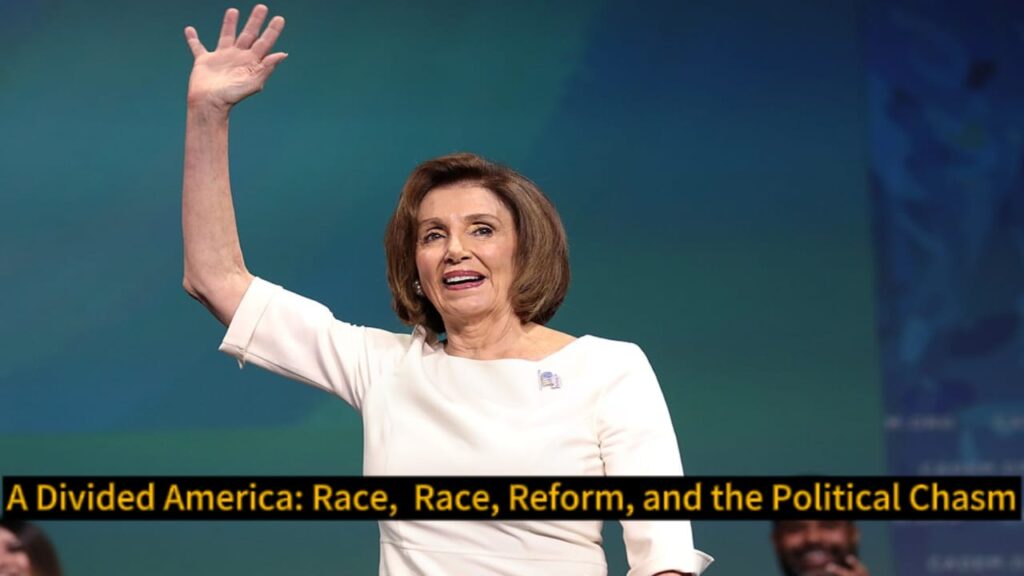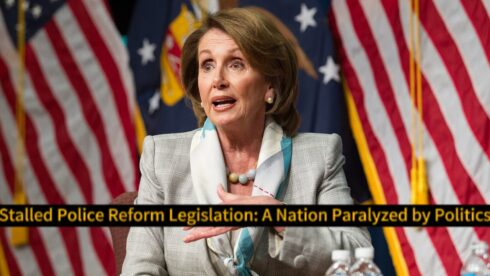Former House Speaker Nancy Pelosi – “Today we pray for the family of George Floyd,” as she stood solemnly at a press event commemorating the fifth anniversary of Floyd’s death. Her voice carried the weight of the moment, as she called it “a tragedy that shook the conscience of a nation.” Nancy Pelosi emphasized the enduring pain suffered by Floyd’s family and Black communities across America, reiterating the need for legislative and cultural reform.
Nancy Pelosi, who was Speaker of the House during the initial wave of protests, remains a leading voice on civil rights and policing reform. She used the platform to push for renewed attention to the George Floyd Justice in Policing Act — legislation that has languished in the Senate amid intense partisan division. “This is not just remembrance,” she stressed, “it is a recommitment to transformation.”
Stalled Police Reform Legislation: A Nation Paralyzed by Politics
Nancy Pelosi expressed deep frustration with the lack of progress on police reform legislation since 2020, blaming what she called “the toxic grip of political cowardice” in the Senate. The George Floyd Justice in Policing Act, which passed the House twice, has yet to clear the Senate, largely due to opposition from Republican lawmakers and moderate Democrats wary of alienating law enforcement unions.
Despite massive protests and global condemnation of police brutality, the bill’s core proposals — banning chokeholds, limiting qualified immunity, and mandating federal oversight of rogue departments — remain unimplemented. Pelosi argued that this inaction amounts to a betrayal of Floyd’s legacy and a direct affront to the movement that his death catalyzed. “We cannot kneel in silence while progress is strangled by partisanship,” she said.
Law Enforcement Accountability Under Threat: The Backslide Begins
In Nancy Pelosi’s words, “We must oppose all efforts to roll back progress against law enforcement accountability.” Her statement targets a growing movement in conservative legislatures that seeks to expand police protections and criminalize protest. Several states have passed laws strengthening qualified immunity and restricting public access to police misconduct records — policies critics say entrench a culture of impunity.
Nancy Pelosi condemned these measures as “antithetical to justice,” warning that they are reversing hard-fought gains. Organizations like the ACLU and NAACP echo her concerns, citing an alarming trend of reactionary policy-making driven by misinformation and fear-mongering. “This is not law and order,” Pelosi asserted, “it is legalized regression.”
A Divided America: Race, Reform, and the Political Chasm

Nancy Pelosi acknowledged the polarization gripping the country, noting that “even basic acknowledgment of racial injustice is now framed as radical.” Her comments reflect a broader concern that race-based reform is increasingly seen through a partisan lens, undermining the bipartisan consensus needed for durable change.
Polling shows that while most Americans support police reform in theory, support plummets when specific policies are discussed. This division is mirrored in Congress and exacerbated by disinformation campaigns online. Pelosi called for moral clarity and civic courage. “We need leaders willing to lose elections for what’s right, not win them by pandering to prejudice,” she said pointedly.
Families Caught in the Crossfire: The Human Toll of Legislative Delay
With emotion in her voice, Nancy Pelosi highlighted the human cost of inaction: “Every day we delay reform, more families suffer irreparable loss.” In the five years since Floyd’s death, over 5,000 Americans have been killed by police, many under questionable circumstances, according to Mapping Police Violence. Each incident reopens the wound and underscores systemic failures.
Floyd’s family has become vocal advocates, but they too feel the fatigue of unfulfilled promises. Pelosi praised their resilience, saying, “They turned grief into purpose, pain into protest.” Yet, she warned that symbolic gestures must give way to substantive policy. “We don’t need more murals — we need mandates,” she stated, drawing applause.
The Future of Reform: Will 2025 Be a Turning Point?
Nancy Pelosi ended her remarks with a call to action: “We stand at a crossroads — will 2025 be the year we finally deliver justice in policing?” Her question is not rhetorical; with another presidential election looming, the future of reform hangs in the balance. Advocates are urging voters to prioritize civil rights issues in local and national races.
Efforts to reintroduce the George Floyd Justice in Policing Act are underway, with renewed support from progressive lawmakers and civil rights groups. Pelosi urged activists to “stay in the streets and in the voting booths,” emphasizing that democracy is the only viable path to structural change. “George Floyd changed the world,” she concluded, “but the world must now change for George Floyd.”














